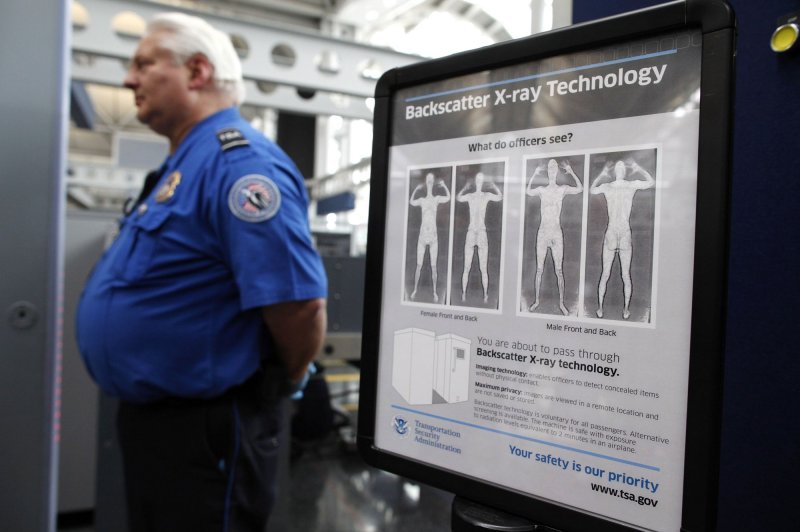A TSA agent screens passengers at O'Hare International Airport in Chicago. File Photo by Brian Kersey/UPI |
License Photo
Oct. 30 (UPI) -- A major security change at U.S. airports that can prevent passengers from boarding their flights is less than a year away.
The upgrade is part of a federal law passed in 2005 that calls for a more secure form of ID for the tens of millions of flyers in the United States each year,
Beginning Oct. 1, 2020, all U.S. air travelers will be required to present identification compliant with the Real ID Act. The program has been gradually rolled out on a state-by-state basis over the last 14 years, but hasn't yet been federally mandated for all states. That will change a year from now.
The law establishes a new set of minimum security standards for state-issued driver's licenses and ID cards -- based on a recommendation by the 9/11 Commission in 2004. Beginning next October, travelers will not be able to board any domestic flight without an upgraded Real ID card -- denoted by a star in the upper right corner.
"This is an important step in enhancing commercial aviation security as we urge travelers to ensure they have compliant documents," acting Homeland Security Secretary Kevin McAleenan said this month. "DHS is committed to states as they continue their efforts to issue Real IDs to Americans."
In addition to state-issued identification, U.S. passengers will also be allowed to fly if they present another acceptable document -- including a valid passport, passport card, U.S. military card or Department of Homeland Security trusted traveler card.
As of Wednesday, 47 states were compliant with the law -- meaning they offer licenses and ID cards that are sufficient for air travel. However, only a little more than a quarter of Americans have been issued a Real ID as of Oct. 1. Also, a recent study by the U.S. Travel Association found that 39 percent -- about 100 million people -- said they do not have any acceptable form of identification that will allow them to fly next October.
Based on that data, 78,500 air travelers would be turned away at airport security checkpoints today if the law was in effect. Experts say that figure could grow to 549,500 in the first week of October 2020.
"Look at Thanksgiving of 2020 when you've got the infrequent fliers that are trying to go see family for a holiday and they're just not able to get there because they're turned away," U.S. Travel Association spokeswoman Tori Emerson Barnes said.
Barnes said part of the reason why so few Americans are compliant is because each state decided on its own strategy to distribute the new IDs. Some states immediately began implementing the program, while others did not.
"We've got 50 states, plus D.C. and the territories all needing to issue Real IDs in the ways that they find appropriate," Barnes added. "So there's a lack of consistency in the way that the implementation has moved forward."
For example in August, Maryland recalled 8,000 compliant cards because they did not meet federal standards. Oregon and Oklahoma have not begun issuing Real IDs and New Jersey is producing them at just two locations statewide.
The process also requires residents to physically report to their state Department of Motor Vehicles and provide documents such as a birth certificate or Certificate of Citizenship to establish their identity, meaning people with older IDs who are accustomed to renewing online may not receive their compliant identification.
The U.S. Travel Organization recommends all adults check with their state motor vehicles department to ensure their identification is acceptable come next fall. It also suggests the federal law be amended to allow mobile and web-based applications -- and automatic compliance among travelers who are PreCheck- and CLEAR-certified. Those cleared to participate in PreCheck and CLEAR undergo repeated background checks and submit biometric data to DHS.
"We feel that biometrics really are your real ID, so for folks that are comfortable opting in to using that technology, which many are, we think that that's one way to alleviate what would otherwise be hysteria at the airports," Barnes said.















